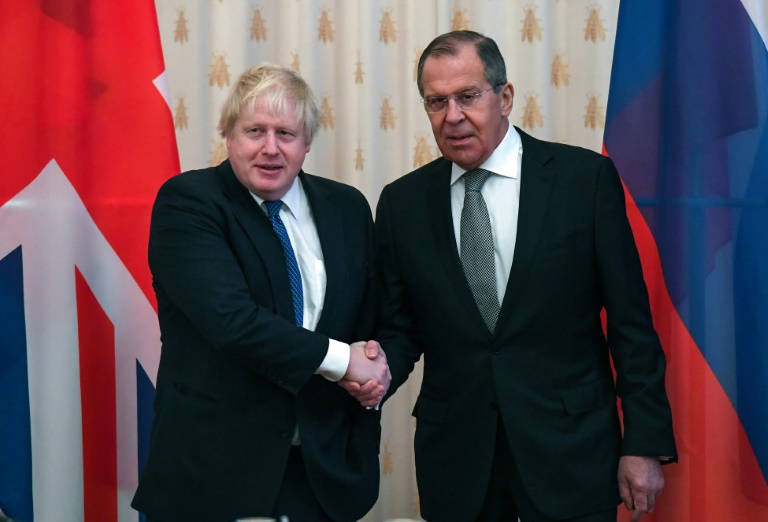
Russian Foreign Minister Sergei Lavrov and British Foreign Secretary Boris Johnson clashed Friday over Russia's alleged interference in the Brexit vote even as they sought to mend ties after years of antagonism.
During the first official visit by a foreign minister from London in five years, the outspoken Johnson attempted to open lines of communication and both foreign chiefs tried to show their two countries were willing to consider rapprochement.
But they also exchanged barbs on everything from Russia's alleged interference in British politics to Moscow's involvement in Ukraine and Syria, and the atmosphere at times grew tense during their joint news conference.
The two appeared to clash over claims that Russia had sought to influence the Brexit vote last year, with Lavrov telling Johnson to come up with hard evidence proving Russia's alleged interference.
- Sparring over Brexit -
Lavrov said he welcomed Johnson's November comment in which the British minister said he saw no evidence, "not a sausage," that Russia had interfered in British elections.
"Not successfully," Johnson interrupted.
"See, he has to say this so that he is not criticised back home, for his reputation," Lavrov responded.
"It's your reputation I'm worried about, Sergei," Johnson hit back jokingly in a tense exchange through interpreters.
Lavrov said accusations of Moscow's meddling in the Western political systems had been invented by the West and that Moscow had yet to see any "concrete evidence" to back them up.
"I think you've made it all up in your Western company," he said. "It's very difficult to climb down from the fence."
Following the 2016 referendum on Brexit, in which Johnson campaigned to leave the European Union, Britain has joined the growing number of Western countries accusing Russia of interfering in their political systems.
Lavrov also complained that London had refused to hand over to Moscow classified information on Alexander Litvinenko's case, referring to the Kremlin critic and former spy, whose murder by radiation poisoning in London in 2006 sent bilateral ties into a tailspin.
At the same time the Russian diplomat praised his talks with Johnson, saying he felt no "hostility," and added that Moscow was ready for dialogue with London on equal terms.
"We are ready to develop dialogue on a very wide range of issues on the basis of principles of equality (and) taking into account and respecting each other's interests," he said.
Moscow wanted Friday's talks to lead to "concrete steps" that would help revive relations, he added.
"Our ties -- there is no secret here -- are at a very low point," Lavrov said.
- 'Duty to work together' -
Johnson for his part called himself a "committed Russophile" and said he wanted to see an improvement in ties between the two nations.
"We have to find a way forward and in the meantime I think we have to cooperate in those areas where we can to build a better future," he said.
"We have a duty to work together for peace and security," he added.
Johnson also pointed to economic cooperation including "increasing exports of Kettle crisps to Russia" and the sale of 300 Bentleys in Russia this year.
The two displayed a degree of camaraderie, with Lavrov joking he trusted his British guest enough to pronounce his first name in the Russian way as "Barees."
Johnson for his part said his trust in Lavrov was so deep that he handed him his coat.
"I can say that there was nothing in the pockets of Boris's coat," Lavrov immediately joked, to which Johnson responded: "So you have searched it already?"
But Johnson himself said he held out little hope that ties with Moscow could undergo a full-blown transformation.
In an interview with Polish news agency PAP ahead of his Russia visit, Johnson said he was "no cold warrior", but he did "not believe for a second that relations with Russia can be reset."
Johnson arrived in Russia after cancelling in April a planned trip at the last minute over Russia's support for the Syrian regime of President Bashar al-Assad.
Britain has also been a fervent supporter of Western sanctions against Russia over its role in the Ukraine conflict and annexation of Crimea in 2014.


